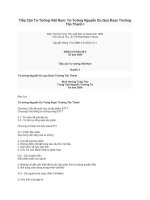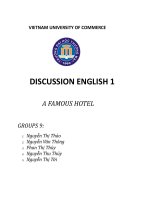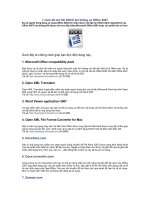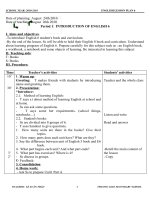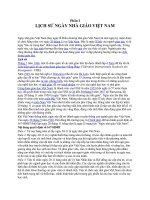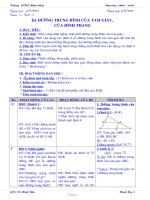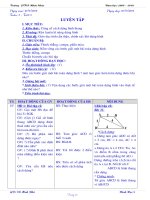N_TaP_TIeNG_ANH_LoP_9_375dd2b76d.docx
Bạn đang xem bản rút gọn của tài liệu. Xem và tải ngay bản đầy đủ của tài liệu tại đây (191.01 KB, 17 trang )
<span class='text_page_counter'>(1)</span><div class='page_container' data-page=1>
<b>ÔN TẬP TIẾNG ANH LỚP 9</b>
<i><b>Gồm 4 trọng tâm:</b></i>
<b>1. Các thì</b>
<b>2. Thể bị động</b>
<b>3. Câu trực tiếp –Gián tiếp</b>
<b>4. Câu điều kiện</b>
<b>BÀI 1: ÔN TẬP VỀ CÁC THÌ </b>
(Lesson 1: Tenses)
<b>Tense</b> <b>Form</b> <b>Signals (Dấu hiệu nhận biết)</b>
<i>1. Present </i>
<i>Simple </i>
<i>(Thì hiện tại đơn)</i>
<b>a/ To be: am / is / are</b>
- I + <b>am</b>
(+) - She / He / It / DTit + <b>is</b>
- We / You / They / DTsn + <b>are</b>
(-) S + be + not +…
(?) Is / are / am + S +….?
<b>b/ Ordinary verbs (ĐT thường)</b>
(+) I / You / We / They + <b>Vnt…</b>
She / He / It + <b>Vs/es</b>
(-) I / You / We / They + <b>don't + Vnt</b> …
She / He / It / Dt it + <b>doesn't + Vnt</b>…
(?) <b>Do</b> + I/You/We/ They / DTsn + <b>Vnt</b>?
<b> Does</b> + she / he / it / DT si + <b>Vnt</b>?
* <b>Adverbs of frequency</b>:<b> </b>
-<i><b>always/usually / frequently / </b></i>
<i><b>occasionally / often / sometimes</b></i>
<i><b>/rarely / seldom / never</b></i>
- every + DTtg
Ex: <i><b>every day, every week, </b></i>
<i><b> every Sunday …</b></i>
<i><b>-</b></i> <i><b>on + thứ</b></i>
<i><b>-</b></i> <i><b>in + tháng/ mùa</b></i>
<i><b>-</b></i> <i><b>in the morning</b></i>
<i><b>-</b></i> <i><b>in the afternoon</b></i>
<i><b>-</b></i> <i><b>in the evening</b></i>
<i>-once / twice / three times… + a </i>
<i>day (a week/…)</i>
<i>* <b>Adverbs of time</b>:</i>
<i>- on + thứ (Monday/ Tuesday…)</i>
<i>- in + tháng (Jabnuary…)</i>
<i>- in + mùa (spring/ summer…)</i>
<i>- on weekend</i>
<i>…</i>
<i>2. Past simple </i>
<i>tense </i>
<i>( Thì quá khứ </i>
<b>a/ To be: were / was</b>
(+) I/She/He/It/DTsi + was
</div>
<span class='text_page_counter'>(2)</span><div class='page_container' data-page=2>
<i>đơn)</i>
We/ You/They/DTsn + were
(-) S + was/were + not +…
(?) Was/Were + S + …?
<b>b/ Ordinary verbs ( ĐT thường)</b>
(+) S + <b>V-ed</b>
(-) S + <b>didn't + Vnt</b>…
(?) <b>Did</b> + S + <b>Vnt</b>…?
Ex: last Sunday / last year
- kg tg + ago
Ex: 2 days ago
- in+ năm trong quá khứ
Ex: in 2004
- in the past
- in the 20th<sub> /19</sub>th<sub> …+centery</sub>
<i>3. Present </i>
<i>progressive tense</i>
<i>(Thì hiện tại tiếp </i>
<i>diễn)</i>
(+) S + <b>is/are/ am + V-ing</b>…
(-) S + <b>is / are / am + not + V-ing…</b>
(?) <b>Is/Are/Am</b> + S + <b>V-ing</b>…?
<i><b>- Now/ at the moment / - at </b></i>
<i><b>present / at this time /- Look! / </b></i>
<i><b>Listen!</b></i>
<i><b>- Be careful! Be quiet!</b></i>
- Keep silent!
- It’s + giờ
- Where is/are + S?
- S(ng) + be + giới từ + địa điểm
<i>4. Past </i>
<i>progressive tense</i>
<i>(Thì quá khứ tiếp </i>
<i>diễn)</i>
(+) S + <b>were/was+ V-ing</b>…
* I/ She/ He/ It/ DTit + was…
* You/ We/ They/ DTsn + were
(-) S + <b>were/ was + not + V-ing</b>…
(?) <b>Were/ Was</b> + S + <b>V-ing</b>…?
<i>-<b> at + giờ</b></i>
<i><b>- at this time +yesterday/</b></i>
<i><b>- at that time </b> <b>last/ ago</b></i>
<i>5. Future simple </i>
<i>tense</i>
<i>(Thì tương lai </i>
<i>đơn)</i>
(+) S + <b>will/shall + Vnt</b>… / (S'll + Vnt…)
(-) S <b>+ will not/shall not</b> + Vnt…
(S + <b>won't/shan't + Vnt</b>…)
(?) <b>Will/Shall</b> + S + <b>Vnt</b>…?
*Note: <b>"shall</b>" chỉ đi với <b>I</b> và <b>We </b>!
*Thì tương lai gần
S + <b>is/are/am + going to + Vnt</b>…
(Diễn tả hđộng chắc chắn sẽ xảy ra do có sự
chuẩn bị trước)
<i><b>-</b></i> <i><b>Tomorrow / tonight</b></i>
<i><b>-</b></i> <i><b>next + Ntg</b></i>
<i><b>-</b></i> <i><b>in the future</b></i>
<i><b>-</b></i> <i><b>in + khoảng tg.( in 10 </b></i>
<i><b>days)</b></i>
<b>-</b> <i><b>in + năm t.lai. </b></i>
Vd<i><b>: in 2021 </b></i>
<i><b>-</b></i> <i><b>sometime/ some day</b></i>
<i><b>-</b></i> <i><b>one day</b></i>
</div>
<span class='text_page_counter'>(3)</span><div class='page_container' data-page=3>
<i>6. Present perfect </i>
<i>tense </i>
<i>( Thì hiện tại hồn</i>
<i>thành)</i>
(+) S + <b>have/has + PII. …</b>
(-) S + <b>haven't/hasn't + PII. …</b>
(?) <b>Have / Has + </b>S<b> + PII. …?</b>
- for + ktg
- since +mốc tg
- already (rồi) / just vừa mới) /
<i>ever (đã từng) / never (+before: </i>
cuối câu): ngay trước <b>PII</b> (CĐ) /
<b>ngay trước been</b> (BĐ).
- yet (chưa) / recently (gần đây) =
<i>lately/ so far/ up to now/ many </i>
<i>times / several times…: </i><b>đứng </b>
<b>cuối câu</b>
<b>Exercise I. Cho dạng đúng của động từ trong ngoặc.</b>
1. I (learn) English for seven years now.
2. They (build) a new power station at the moment.
3. When I was buying the stamps somebody (call) my name.
4. 'What time (Kevin come)?' 'An hour ago.'
5. I (not go) to the cinema last night. I was too tired.
6. Carol invited us to the party but we (not go). We had other things to do.
7. I saw Bridget at the museum when I was going to the restaurant but she (not see) me.
8. 'Where (your parents live) ?' 'In a village near London. They have always lived there.'
9. She speaks English but she (not speak) French.
10. Jeff is from London. He (live) there all his life.
11. My favourite country is Canada. I (be) there four times.
12. 'How long (you study) Photography?' 'For one year.'
13. At about 8.00 last night, she (watch) TV.
14. “I (buy) a new car next week.”
15. I (buy) a new car next week. I have saved enough money.
<b>HƯỚNG DẪN LÀM BÀI I</b>
<b>I. Cho dạng đúng của đọng từ trong ngoặc.</b>
1. I (learn) English for seven years now.
</div>
<span class='text_page_counter'>(4)</span><div class='page_container' data-page=4>
<i><b>=> have learnt</b></i>
2. They (build) a new power station at the moment.
- Dùng HTTD. Vì có cụm từ “<i><b>at the moment</b></i>”
=> are building
3. When I was buying the stamps somebody (call) my name.
- Dùng thì QKĐ. Hành động đang diễn ra (QKTD: When I was buying…) thì hành động
khác xen vào (QKĐ):
=> called
4. 'What time (Kevin come)?' 'An hour ago.'
- Dùng QKĐ. Vì câu trả lời nhắc đến cụm từ chỉ thời gian trong quá khứ: “An hour ago”
=> did Kevin come (Vì là câu hỏi nên ta phải mượn trờ ĐT ở quá khứ là “did” và để
trước chủ ngữ
5. I (not go) to the cinema last night. I was too tired.
- Dùng QKĐ. Vì có dấu hiệu “last night”
=> didn’t go. (Vì là câu phủ định nên ta phải mượn TĐT ở quá khứ là “did”, “not” đề sau
“did”, ta có thể viết đây đủ là <i><b>did not go = didn’t go</b></i>
6. Carol invited us to the party but we (not go). We had other things to do.
- Cũng dùng QKĐ. Vì có dấu hiệu là 1 hành động trong QK: “invited”
=> didn’t go / did not go
7. Where is Lan? – She (read) a novel in her room.
- Dùng HTTD. Vì có dấu hiệu NB là: “Where + is + Lan (CN chi người)
=> is reading
8. 'Where (your parents live) ?' 'In a village near London. They have always lived there.'
- Dùng HTĐ. Vì câu trả lời dùng HTHT tức là vân còn sống, và “live” là hoạt động lâu
dài,ổn định.
=> do your parents live (Câu hỏi HTĐ phải mượn TĐT là do / does. CN là parents-số
nhiều => mượn “do”)
9. She speaks English but she (not speak) French.
- Dùng HTĐ. Vì vế trước là thì HTĐ và có liên từ “but” – “nhưng” chỉ sự đối lập
=> doesn’t speak (Câu phủ định phải mượn do / does. Chủ ngữ số ít (She) -> mượn
“Does”
</div>
<span class='text_page_counter'>(5)</span><div class='page_container' data-page=5>
- Dùng HTHT. Vì có DHNB là: since
=> has lived
11. My favourite country is Canada. I (be) there four times.
- Cũng dùng HTHT. Vì có DHNB là “four times”
=> have been
12. 'How long (you study) Photography?' 'For one year.'
- Vẫn dùng HTHT. Vì Câu hỏi dùng “How long …?” và câu trả lời: “For + Khoảng thời
gian: “one year”
=> have you studied. (Câu hỏi phải đảo “have” lên trước CN)
- chú ý: Ta cũng có thể dùng HTHT tiếp diễn. vì Câu trả lời nhấn về thời gian (Các em đi
bồi giỏi biết rõ điều này rồi.) => have you been studying
13. At about 8.00 last night, she (watch) TV.
- Dùng QKTD. Vì dấu hiệu NB là: “At about 8.00 last night”
=> was watching
14. “I (buy) a new car next week.”
- Dùng TLĐ. Vì DHNB là: “next week”
=> will buy
15. I (buy) a new car next week. I have saved enough money.
- Dùng TL gần. Vì có DHNB là “next week”, nhưng cịn có thêm tình huống là câu sau,
giúp chúng ta biết là sự việc chắc chắn xảy ra vì có sự chuẩn bị trước.
=> am going to buy
<b>BÀI 2: THỂ BỊ ĐỘNG </b>
(Lesson 2: Passive voice)
<b>Tense</b> <b>Active Form (Dạng chủ động)</b> <b>Passive Form (Dạng bị động)</b>
1. Present
simple tense
(+) S + Vs/es + O + adv(n) + adv(tg)
(-) S + don't/doesn't + Vnt + O …
(?) Do/Does + S + Vnt + O …?
(+)S<b>(o)</b>+is/are/am+PII<b>.</b>+adv(n)+adv(tg)+by sb (S)
(-) S<b>(o)</b>+is/are/am + not+PII …
(?) Is/Are/Am +S<b>(o) </b>+PII …?
2. Past
simple tense
</div>
<span class='text_page_counter'>(6)</span><div class='page_container' data-page=6>
(-) S + didn't + Vnt + O …
(?) Did + S + Vnt + O …?
(-) S<b>(o)</b>+were/was + not + PII …
(?) Were/Was +S<b>(o) </b>+PII …?
3. Present
progressive
(+) S + is/are/am +V-ing + O + …
(-) S + is/are/am + V-ing + not + O
(?) Is/Are/Am + S + V-ing + O …?
(+)S<b>(o)</b>+is/are/am+ <b>being</b> + PII<b>.</b>+ …
(-) S<b>(o)</b>+is/are/am + not + <b>being</b> + PII …
(?) Is/Are/Am +S<b>(o) </b>+ <b>being</b> + PII …?
4. past
progressive
(+) S + were/was +V-ing + O + …
(-) S + were/was + V-ing + not + O
(?) Were/Was + S + V-ing + O …?
(+)S<b>(o)</b>+ were/was + <b>being</b> + PII<b>.</b>+…….
(-) S<b>(o)</b>+were/was + not + <b>being</b> + PII …
(?) Were/Was +S<b>(o) </b>+ <b>being</b> + PII …?
5. Future
simple +
Modal verbs
(+) S + §TKT + Vnt + O +…
(-) S + §TKT + not + Vnt + O …
(?) §TKT + S + Vnt + O …?
* ĐTKT: will / would / shall / should /
<i>can/ could/ may/ might/ must/ ought to </i>
* Những cụm động từ sau cũng được coi
như những động từ khuyết thiếu: have
<i>to / had better/would rather/ be going to</i>
(+)S<b>(o)</b>+ ĐTKT + be + PII<b>.</b>+…….
(-) S<b>(o)</b>+ ĐTKT + not + be + PII …
(?) ĐTKT + S<b>(o) </b>+ be + PII …?
6. Present
perfect
(+) S + have / has + PII + O +…
(-) S + haven't / hasn't + PII + O …
(?) Have / Has + S + PII + O …?
(+) S<b>(o)</b>+ have / has + been + PII<b>.</b>+…….
(-) S<b>(o)</b>+ haven't / hasn't + been + PII …
(?) Have / Has + S<b>(o) </b>+ been + PII …?
<b>Câu bị động đặc biệt (1): Dạng tường thuật</b>
Chủ động S1 + V1 + (that) + S2 + V2 ……
Bị động Cách 1: It + be + PII (V1) + (that) + S2 + V2 ….
Cách 2: S2 + be + PII (V1) to + Vnt (V2) ……
Have + PII (V2) ……
Notes - S1thường là: they, people, someone, somebody ….
- V1 thường là: to say, to think, to believe, to report, to rumor, to expect, to
<i>know, to hope, to see,to acknowledge (thừa nhận) ….</i>
<b>Exercise II. Chuyển các câu sau sang câu bị động</b>
</div>
<span class='text_page_counter'>(7)</span><div class='page_container' data-page=7>
2. John invited Fiona to his birthday party last night.
3. Her mother is preparing the dinner in the kitchen.
4. We should clean our teeth twice a day.
5. Our teachers have explained the English grammar.
6. Some drunk drivers caused the accident in this city.
7. Tom will visit his parents next month.
8. The manager didn’t phone the secretary this morning.
9. Did Mary buy this beautiful dress?
10. I had my nephew paint the gate last week.
<b>HƯỚNG DẪN LÀM BÀI II</b>
<b>Các em lưu ý khi làm bài tập chuyển sang câu bị đông:</b>
<i><b>Việc đầu tiên các em phải xác định được chủ ngữ, động từ và tân ngữ.</b></i>
<i><b> Sau đó, xác định rõ thì gì. </b></i>
<i><b>Tiếp theo là nhớ lại cấu trúc câu bị động của thì đó. </b></i>
<i><b>Và Cuối cùng là các thay đổi về đại từ nếu có.</b></i>
1.My father waters this flower every morning.
S Vht
đ
O Adv (tg)
=> This flower is watered by my father every morning.
S(O) +is+ P2 by + sb(S) Adv (tg)
2. John invited Fiona to <b>his</b> birthday party last night.
S Vqkđ O Adv (nc) Adv (tg)
=> Fiona was invited to <b>John’s</b> birthday party last night.
</div>
<span class='text_page_counter'>(8)</span><div class='page_container' data-page=8>
* Chú ý: từ “his” phải được chuyển thành từ “John’s”
3. Her mother is preparing the dinner in the kitchen.
S Vhttd O Adv (tg)
=> The dinner is being prepared in the kitchen by her mother.
S(O) + is being + P2 Adv (nc) Adv (tg)
4. We <i><b>should</b></i> clean our teeth twice a day.
S ĐTKT Vnt O Adv (ts)
=> Our teeth <i><b>should</b></i> be cleaned twice a day.
S(O) ĐTKT + be + P2 Adv (ts)
5. Our teachers have explained the English grammar.
S V (htht) O
=> The English grammar has <i><b>been</b></i> explained by our teachers.
S(số ít) (O) has + been +P2 by + sb(S)
6. Some drunk drivers caused the accident in this city.
S Vqkđ O Adv (tg)
=> The accident was caused in this city <i><b>by</b> </i> some drunk drivers.
S(O) + was + P2 adv (nc) By + sb (S)
7. Tom will visit his parents next month.
S ĐTKT Vnt O Adv (ts)
=> Tom’s parents be visited<b>will</b> (by him) next month.
S(O) ĐTK + be + P2 by + sb (S) Adv (ts)
8. The manager <b>didn’t</b> phone the secretary this morning.
S V-QKĐ,
phủ định
O adv (tg)
=> The secretary <b>wasn’t</b> phoned by the manager this morning.
</div>
<span class='text_page_counter'>(9)</span><div class='page_container' data-page=9>
9. Did Mary buy this beautiful dress?
TĐT S Vnt adv (tg)
=>Was this beautiful dress bought by Mary?
Was + S (O) +P2 By sb (s) ?
10. I had my nephew paint the gate last week.
S have +sb Vnt st Adv(tg
)
*Đây là một trong các dạng câu bị động đặc biêt. Chúng ta cần áp dụng cấu trúc sau:
CĐ: S + to have + sb + Vnt + st
BĐ: S + to have + st + P2 (by sb)
=> I had the gate painted by my nephew last week.
S have + st + P2 by sb Adv(tg)
<b>BÀI 3: CÂU TRỰC TIẾP-GIÁN TIẾP </b>
(Lesson 3: Direct – Indirect Speech)
<b>A. </b>PHÂN LOẠI CÂU + CẤU TRÚC
<b>I. Câu kể </b><i>(gồm câu khẳng định, câu phủ định):</i>
*Cấu trúc trực tiếp (CTTT):
is / are / am (not)…
</div>
<span class='text_page_counter'>(10)</span><div class='page_container' data-page=10>
"<b>S1</b> + Vnt / Vs/es / Ved … " <b>S2</b> + said (to <b>sb</b>) / told <b>sb</b>.
don't / doesn't / didn't + Vnt …
* Cấu trúc gián tiêp (CTGT):
was / were…
<b>S2</b> + said (to sb) / told sb + (that) + <b>S1</b> + could / would / might (not) + Vnt …
Ved …
didn't + Vnt …
<b>II. Câu đề nghị yêu cầu</b>
* CTTT:
" Vnt … "
You should + Vnt …
Can / Could / Will + you + Vnt …(for me)? <b>S2 </b>+ said to sb/ asked sb/ told sb/advised <b>sb</b>.
Don't + Vnt …
You shouldn't + Vnt …
*CTGT:
to + Vnt …
to + Vnt …
<b>S2</b> + asked / told/ advised + <b>sb</b> + to + Vnt …
not + to Vnt …
not + to vnt …
<b>III. C</b>âu hỏi nghi vấn
* CTTT:
" Is/Am/Are … "
Do / Does / Did Vnt …
</div>
<span class='text_page_counter'>(11)</span><div class='page_container' data-page=11>
Have / Has PII …
*CTGT:
was / were …
asked sb Ved …
<b>S2</b> + wondered + <i><b>if / whether </b></i>+ <b>S1</b> + could / would / might Vnt …
wanted to know didn't + Vnt …
had + PII …
<b>IV. Câu hỏi có tuwf để hỏi</b> (WH: who / which / where / when / how many + N / how old…)
* CTTT:
" is / am / are … "
do / does / did Vnt …
<i><b>WH</b></i> + can / will / may + <b>S1</b> + Vnt … ? <b>S2</b> + said to sb/ asked <b>sb.</b>
don't / doesn't / didn't Vnt …
have / has PII …
*CTGT:
was / were …
asked sb Ved …
<b>S2 </b>+ wondered + <i><b>WH</b></i><b> + S1</b> + could / would / might / Vnt …
wanted to know didn't + Vnt …
had + PII …
<b>B. MỘT SỐ THAY ĐỎI CẦN NHỚ</b>
<b>I. Thay đổi về các đại từ:</b>
</div>
<span class='text_page_counter'>(12)</span><div class='page_container' data-page=12>
3. …………<i><b>me/us </b>……<b>me/us </b></i>……….. 1 ĐTTN…. ………..<b>S2</b>…………..
4. ………..<i><b>mine/ours</b>…<b>mine/ours</b></i>………..1 ĐTSH….………..…….<b>.S2</b>…………..
5. ………<i><b>myself/ourselves </b>…<b>myself/ourselves …...1 </b>ĐTPT…… ……..……..</i><b>S2</b>………
6. ………..<i><b>you (S)</b> ………….<b>you (S)</b></i>………. 1 ĐTNX………<b>sb</b>………….
7. ………..<i><b>your</b>……….<b>your</b></i>………1 TTSH……….<b>sb</b>…………
8. ………..<i><b>you (O)</b>………….<b>you (O)</b></i>………..1 ĐTTN……….. .<b>sb</b>………….
9. ………..<i><b>yours</b>…………..<b>yours</b></i>………1 ĐTSH……….<b>sb</b>………….
10. ……..<i><b>yourself/yourselves</b></i>…Đ<i><b>TPT ….</b></i>………. 1 ĐTPT………<b>sb</b>…………..
<b>II. Các thay đổi khác</b>:
<i>Trực tiếp</i>
<i>(Direct speech)</i>
<i>Gián tiếp</i>
<i> (Indirect speech)</i>
<i>Trực tiếp</i>
<i> (Direct speech)</i>
<i>Gián tiếp</i>
<i>(Indirect speech)</i>
1. is / am / are was / were 9. today that day
2. have / has + PII had + PII 10. tonight that night
3. can / will could / would 11. tomorrow the following day
the next day
4. may / must might / had to 12. <b>next</b> Sunday <b>the following</b> Sunday
<b>the next</b> Sunday
5. this that
13. yesterday <b>the previous</b> day
6. these those <b>the day</b> before
7. here there
14<b>. last</b> night <b>the night</b> before
8. now then
<b>the previous</b> night
15. <b>ago</b> <b>earlier</b>
<b>before</b>
16. the day after
tomorrow
In 2 days’ time
</div>
<span class='text_page_counter'>(13)</span><div class='page_container' data-page=13>
1. “ I have something to show you now.” He said to me.
=> He told me………..
………..………..…………
2. “ I’m leaving here for Hue tomorrow.” She said.
=> She said………..
………..………..………
3. “ I’ll come with you as soon as I am ready.” Tom said to her.
=> Tom told her………..
………..………..……
4. “ I must go now.” The father said to us.
=> The father told us………..
………..……….
5. “ Why do you come here late?” she asked me.
=> She asked………..
………..………..…………
6. “ Who puts the salt in my cup of coffee?” asked Peter.
=> Peter asked………..
………..………..………
7. “ Can you play the piano?” he asked the girl.
=> He asked the girl………..
………..……….
8. “ I’m having a good time here.” Said Maryam.
=> Maryam said………..
………..………..……
9. “ Do you like pop music?” Hoa asked Maryam.
=> Hoa asked Maryam………..
………..………
10. “ Where do you live, the boy?” asked the man.
=> The man asked………..
………..………..
</div>
<span class='text_page_counter'>(14)</span><div class='page_container' data-page=14>
1.“ <b>I </b><i><b>have</b></i> something to show <b>you</b> <i><b>now</b></i>.” He said to me.
S2 sb
(HD: trong câu Trực tiếp có I thì đổi I thành 1 ĐtNX tương ứng với S2. Còn “you” là tân
ngữ thì đổi thành 1 ĐTTN tương ứng với sb. Các em cứ thực hiện các thay đôi theo các
hướng dẫn ở trên nhé)
=> He told me <b>he</b><i><b>had</b></i> something to show <b>me </b><i><b>then</b></i>.
S2 sb
2. “ <i><b>I</b></i>’<b>m</b> leaving here for Hue <i><b>tomorrow</b></i>.” She said.
=> She said that <i><b>she</b></i><b>was</b> leaving for Hue <i><b>the following day</b></i>.
3. “ <b>I</b>’<i>ll</i> come with <i>you</i> as soon as <b>I</b> <i><b>am</b></i> ready.” Tom said to her.
=> Tom told her that <b>he </b><i>would</i> come with <i>her</i> as soon as <b>he</b> <i><b>was</b></i> ready.
4. “ <b>I</b><i>must</i> go <i><b>now</b></i>.” The father said to us.
=> The father told us <b>he</b> <i>had to</i> go <i><b>then</b></i>.
5. “ Why do you come here late?” she asked me.
=> She asked me why I came here late.
6. “ Who puts the salt in <b>my</b> cup of coffee?” asked Peter.
=> Peter asked who put the salt in <b>his</b> cup of coffee.
7. “ Can <b>you</b> play the piano?” he asked the girl.
=> He asked the girl <i>whether / if</i><b>she</b> could play the piano.
8. “ <b>I</b><i>’m</i> having a good time <i><b>here</b></i>.” Said Maryam.
=> Maryam said <b>she </b><i>was</i> having a good time <i><b>there</b></i>.
9. “ Do <i>you</i> like pop music?” Hoa asked Maryam.
=> Hoa asked Maryam <b>if / whether</b><i>she</i> liked pop music.
</div>
<span class='text_page_counter'>(15)</span><div class='page_container' data-page=15>
=> The man asked (me) where <i>I</i> <b>lived</b>.
<b>BÀI 4: CÂU ĐIỀU KIỆN </b>
(Lesson 4: The first Conditional sentences)
<b>Giới thiêu chung: </b>Trong Tiêng Anh có nhiều loại câu điều kiện cơ bản, như câu điều kiện loại 1, câu
điều kiện loại 2, CĐK loại 3, CĐK loại hỗn hợp… Nhưng trong chương trình Anh 9 đại trà, các em chỉ
cần nắm vững 2 loại câu điều kiện, đó là CĐK Zero vàCĐK loại 1 (Cịn CĐK loại 2 thì đến Unit 10 các
em mới học)
*Đặc điểm câu điều kiện: Ln có 2 mệnh đề, thường gọi là mệnh đề chính (Main Clause) và mệnh đề
phụ (<i><b>If</b></i> clause). Ở dạng mở rộng nâng cao, các em sẽ không thấy chữ “if” trước mệnh đề phụ.
Example: <i><b>If I have</b></i> free time, I will help you. (Nếu tơi có thời gian rảnh rỗi, tơi sẽ giúp bạn)
<i><b>Should </b><b> I have</b></i> free time, I will help you.
<b>Type (loại)</b> <b>Main clause (Mệnh đề chính)</b> <b>if clause (Mệnh đề phụ)</b>
<i><b>a. zero</b></i>
<i>(Chắc chắn xảy </i>
<i>ra)</i>
- (Please +) Vnt …
- S + V(htđ) ….
if + S + V (htđ)…
* Đảo ngữ:
<i><b>b. Type 1</b></i>
<i>(Có thể xảy ra ở </i>
<i>hiện tai hoặc </i>
<i>tương lai)</i>
(+)S+will/shall/can/may/must + Vnt
(-)S + won't/shan't…+ Vnt…
(?) Will/Shall/ …+ S + Vnt…
<b>if</b> + S + V (ht)…
<b>* Đảo ngữ</b>:
<b>Should </b>+ S + Vnt…
*Lưu ý: 1) If …not = unless
2)) Vnt …..+ <b>or </b>+ MĐ chính (Hãy …. Kẻo …..)
= If you don’t + Vnt…., + MĐ chính (Nếu bạn khơng ….., ….)
</div>
<span class='text_page_counter'>(16)</span><div class='page_container' data-page=16>
1. If I see him, I _____ (give ) him a gift.
2. If I had a typewriter, I _____ (type) it myself.
3. If I had known that you were in hospital, I _____ (visit) you.
4. You could make better progress if you _____ (attend) class regularly.
5. If I _____ (know) his telephone number, I’d give it to you.
6. If you _____ (arrive) ten minutes earlier, you would have got a seat.
7. If he worked more slowly, he _____ (not make) so many mistakes.
8. I shouldn’t drink that wine if I _____ (be) you.
9. If I _____ (find) a cheap room, I will stay a fortnight.
10. A lot of people _____ (be) out of work if the factory closed down.
<b>HƯỚNG DẪN LÀM BÀI IV</b>
1. If I see him, I _____ (give) him a gift.
- “see” là động từ nằm trong mệnh đề phụ, chia ở hiện tại đơn => câu ĐK loại 1. Vậy,
“give” nằm trong MĐ chính sẽ chia ở thì TLĐ.
=> will give
2. If she has a typewriter, she _____ (type) it herself.
- “has” là động từ nằm trong mệnh đề phụ, chia ở hiện tại đơn => câu ĐK loại 1. Vậy,
“type” nằm trong MĐ chính sẽ chia ở thì TLĐ.
=> will type
3. If he (have) free time, he will visit you.
- Mênh đề chính có “will visit” cho biết câu ĐK loại 1 => MĐP chia ở thì hiện tại đơn.
=> has (Vì chủ ngữ là “He”)
4. You can make better progress if you _____ (attend) class regularly.
- Trong MĐ chính có “can” cho biết đó là câu ĐK loại 1 => MĐP chia ở thì HTĐ.
=> attend (Chủ ngữ là “You” + Vnt)
</div>
<span class='text_page_counter'>(17)</span><div class='page_container' data-page=17>
- MĐ Chính có “may give” cho biết đây là câu ĐK loại 1. Vậy “know” ở MĐ phụ chia ở
HTĐ.
=> know (Chủ ngữ “You” + Vnt)
6. If your sister _____ (arrive) ten minutes early, she will have a good seat.
- Trong MĐ chính có “will have” cho biết loại 1. Vậy “arrive” ở MĐ phụ chia ở HTĐ.
=> arrives (CN “your sister” là ngô 3 số ít + Vs/es)
7. If he (work) more slowly, he won’t make mistakes.
- (Trong MĐ chính có “won’t make” là thì TLĐ => động từ “work” trong MĐ chính phụ
phải chia ở HTĐ.
=> works (CN là “He” + Vs/es)
8. Lam shouldn’t drink that wine if he (drive) to work.
- MĐ chính có “shouldn’t drink” cho biết loại 1 => “work” trong MĐ phụ chia ở thì
HTĐ.
=> works (CN là “He” + Vs/es)
9. If you walk in the rain without a raincoat or an umbrella, you (get) wet.
- “walk” trong MĐ phụ chia ở hiện tại đơn nhưng nghĩa của câu diễn đạt sự việc chaecs
chắn xảy ra cho nên phải dùng câu ĐK loại zero: Tức là MĐ chính ta cũng dùng thì HTĐ.
=> get (CN là you + Vnt)
10. A lot of people _____ (be) out of work if the factory closes down.
- Trong MĐ phụ có “closes” chia ở HTĐ cho nên đây là câu ĐK loại 1. Vây “be” ở MĐ
chính sễ chia ở thì TLĐ.
</div>
<!--links-->

